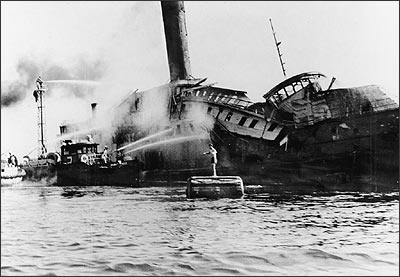 |
Exodus 1947
Before there was an Israel, an inexperienced crew of young Americans
climbed aboard a rusted American ferryboat and set out from Philadelphia
to transport thousands of Jewish Holocaust survivors past the British
blockade of Palestine. Other ships had tried it. But this ship,
which would come to be known as the Exodus 1947, was the one that
helped shape the political landscape of the Middle East.
At the helm was "Big Bill" Millman, a 19-year-old Navy
boxing champ. Frank Lavine, part of the deck crew, was 22 and
completely unprepared for the kind of battle he would face against
the British Marines. And in the engine room, an electrician named
Nat Nadler helped keep the boilers lit, never imagining that he
was about to participate in the birth of a nation. This is their
story.
The Steamship President Warfield and the Journey Ahead
 Listen
(RealPlayer) Listen
(RealPlayer)
 |
| (Photo: The Mariners' Museum,
Newport News, VA.) |
Baltimore, 1946 - The USS President Warfield, a former Chesapeake
Bay pleasure steamer, is towed from a scrap yard for an illegal
mission thousands of miles away. It's shortly after World War
II and Jews all over Europe are languishing in Displaced Persons
or "DP" camps. Most, if not all of them yearn to immigrate
to Palestine, the land they believe to be promised to them in
biblical prophecy. But Palestine is still under the control
of the British, who are only letting 1,500 Jewish immigrants
into the territory per month. More, they fear, would incite
an explosive clash between the Jews and the Arabs. Nonetheless,
a secret Jewish military is buying ships like the Warfield and
hiring eager, young men - some with sailing experience, some
without - to run holocaust survivors past the British blockade.
Frank Lavine, Nat Nadler, and "Big Bill"Millman were
three of those men. As Bill says, you would have had to have
been "brave, stupid and have a cause" to sail the
Warfield across the Atlantic. Still, they climbed aboard, with
nearly 40 others, little knowing that their actions would soon
help change the Middle Eastern power structure for the foreseeable
future.
The Trip to Palestine and First Confrontations with the
British
 Listen
(RealPlayer) Listen
(RealPlayer)
 |
| (Photo: The Mariners' Museum,
Newport News, VA.) |
Once in Europe, the crew prepares the ship to receive its human
cargo. Most of the men have never encountered Jewish holocaust
survivors before. And in July of 1947, the crew is charged with
the task of loading more than 4,500 of them into the holds of
the Warfield. Meanwhile, the British have followed their every
move, from Marseilles, France to Portovenere, Italy, back to
Sète, France. Be it bravery, or mere naiveté, the crew
carries on undeterred.
It's only when the Warfield sets out onto the Mediterranean
that the British make their presence more obvious. Six men o'
war tail the Warfield on its course to Palestine, occasionally
yelling at the Americans to give up. But the confrontation just
makes the crew more resolved to carry out their mission. On
the fifth day at sea, a radio transmission from Palestine instructs
the Warfield that it has a new name, the name by which it would
later become famous: "Exodus 1947."
Confrontation with the British: Victory in Loss
Listen
(RealPlayer)
 |
| (Photo: The Mariners' Museum,
Newport News, VA.) |
July 18, 1947 - The Exodus reaches Palestine under its own
power, but not under its original command. The British have
bloodied refugees and crewmen in a vicious struggle twenty-five
miles out at sea from Palestine. Some thirty refugees are badly
wounded. Two are dead. And one crewman clings to life as the
ship pulls in to Haifa harbor, where three British prison ships
are waiting.
The refugees are herded off the Exodus to spend mere moments
in the nation where they hoped to spend the rest of their lives.
Soon, the prison ships Ocean Vigour, Runnymede Park and Empire
Rival depart with the same human cargo on board. The refugees
and crew of the Exodus believe they're headed for Displaced
Persons camps Cyprus, a day's journey at best. But as one day
turns into two, and three, and as Cyprus becomes more and more
distant, it's clear that the British have special plans for
their passengers. The Exodus was bigger than any blockade-runner
before it, carried more passengers than any other. Plus it had
just engaged the British marines in a four hour battle on the
high seas. The British decide to make an example out of these
latest would-be immigrants. Instead, they make the political
mistake of a decade.
|
 |

